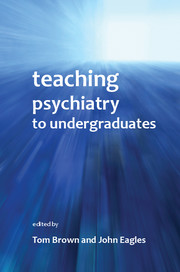Book contents
- Frontmatter
- Contents
- List of figures, tables and boxes
- List of contributors
- Preface
- Foreword
- 1 How do students learn?
- 2 Recent developments in undergraduate medical education
- 3 Undergraduate psychiatry teaching – the core curriculum
- 4 The organisation of undergraduate teaching
- 5 Assessment of undergraduates in psychiatry
- 6 Using computers to teach undergraduate psychiatry
- 7 How to give a lecture
- 8 How to do small-group teaching
- 9 Problem-based learning
- 10 Teaching trainee psychiatrists how to teach medical students: the Southampton model
- 11 Involving trainees in teaching
- 12 Involvement of service users in psychiatric education
- 13 Time-efficient clinical teaching
- 14 Intercalated degrees
- 15 Undergraduate experiences of psychiatry: a student view
- 16 Integration: teaching psychiatry with other specialties
- 17 Teaching the teachers in a cross-cultural setting: the Scotland–Malawi Mental Health Education Project
- 18 International undergraduate teaching
- 19 Teaching with simulated patients and role-play
- 20 Undergraduate medical education and recruitment to psychiatry
- 21 Choosing psychiatry: factors influencing career choice among foundation doctors in Scotland
- 22 Funding of the teaching of medical undergraduates
- 23 Dealing with students in difficulty
- 24 Training medical students to promote good mental health in secondary schools
- 25 Women in medicine
- Index
Foreword
Published online by Cambridge University Press: 02 January 2018
- Frontmatter
- Contents
- List of figures, tables and boxes
- List of contributors
- Preface
- Foreword
- 1 How do students learn?
- 2 Recent developments in undergraduate medical education
- 3 Undergraduate psychiatry teaching – the core curriculum
- 4 The organisation of undergraduate teaching
- 5 Assessment of undergraduates in psychiatry
- 6 Using computers to teach undergraduate psychiatry
- 7 How to give a lecture
- 8 How to do small-group teaching
- 9 Problem-based learning
- 10 Teaching trainee psychiatrists how to teach medical students: the Southampton model
- 11 Involving trainees in teaching
- 12 Involvement of service users in psychiatric education
- 13 Time-efficient clinical teaching
- 14 Intercalated degrees
- 15 Undergraduate experiences of psychiatry: a student view
- 16 Integration: teaching psychiatry with other specialties
- 17 Teaching the teachers in a cross-cultural setting: the Scotland–Malawi Mental Health Education Project
- 18 International undergraduate teaching
- 19 Teaching with simulated patients and role-play
- 20 Undergraduate medical education and recruitment to psychiatry
- 21 Choosing psychiatry: factors influencing career choice among foundation doctors in Scotland
- 22 Funding of the teaching of medical undergraduates
- 23 Dealing with students in difficulty
- 24 Training medical students to promote good mental health in secondary schools
- 25 Women in medicine
- Index
Summary
Recruitment of UK medical school graduates into psychiatry is in crisis as I write this. Each year, it seems that we persuade fewer and fewer of our own trainees to follow us into a specialty that we know can offer frustration alongside fascination, but that is, overall, a challenging and rewarding career choice. The College has followed the decline in interest shown by our own medical school graduates through the falling proportion of candidates for the MRCPsych with a primary medical qualification from the UK. This varies between individual examination sittings but is currently running at between 10% and 20%. Where should we look to understand what is going wrong as a first step in trying to reverse the apparent decline? Most of us chose psychiatry on the basis of our undergraduate experience. My own exposure to Ruth Seifert and Anthony Clare at Barts in the early 1980s left me in no doubt that I wanted to become a psychiatrist, despite the counsel and disapproval of the charismatic physicians whom I was subsequently to work for. All the anecdotal evidence that I have been able to glean from undergraduates, foundation and specialist trainees suggests that the medical student experience of psychiatry is currently a dispiriting one. Transient placements with chaotic community teams, where the consultant psychiatrist presents as disengaged and disillusioned rather than inspirational, and poor-quality didactic teaching, delivered by often reluctant teachers, lead unsurprisingly to career choices other than psychiatry.
The material presented in this book represents an important step towards the delivery of high-quality and inspirational undergraduate teaching. Contributions from a hand-picked team of authors cover an imaginative and thought-provoking range of topics. A nucleus of the authors comes from a highly experienced Scottish group who have collected data and written widely about undergraduate psychiatry teaching. The editors have also recruited writers who are distinguished within relevant fields of medical education but find themselves, through accident of birth or employment, on the other side of Hadrian's Wall. The result is a book that carries an international relevance and contains the best ideas and solutions that our profession can provide.
- Type
- Chapter
- Information
- Teaching Psychiatry to Undergraduates , pp. xii - xivPublisher: Royal College of PsychiatristsPrint publication year: 2011

